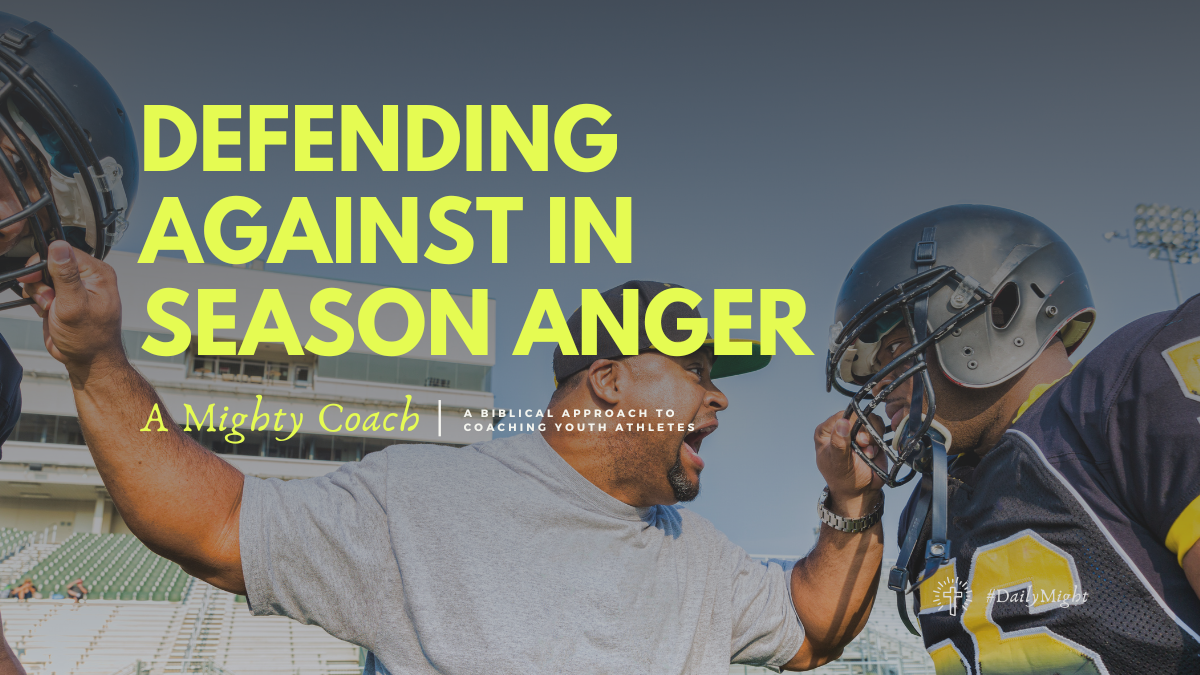Defending Against In Season Anger

Experiencing anger during a season isn’t wrong, and it doesn’t mean you don’t care for your athletes. But letting anger derail the success of a session can be catastrophic for relationship building. Here’s how to guard against it. #DailyMight
Experiencing anger isn’t wrong. Letting anger control you is wrong – and can be damaging to the coach-athlete relationship. Do not let the event, practice, or game (or post game) end in anger. Deal with anger as it comes rather than letting it build. #DailyMight
Have you ever gotten the feeling that a practice is going off the rails? You can feel yourself getting more angry, and more frustrated by the minute. The plan isn’t working, the kids are having a hard time engaging, and your job to make the session worthwhile is at risk. My first response in these situations is to stop listening and start yelling (hey, we all have things to work on right). Anger comes in many disguises as you dredge through a season. It’s not if anger arrives, but when. Experiencing anger during a season isn’t wrong, and it doesn’t mean you don’t care for your athletes. But letting anger derail the success of a session can be catastrophic for relationship building and we need to be self aware of its presence and how to fend off its attacks.
There are several ways to identify anger and be self aware of it’s presence as events start to build. I know for me, as the anger train barrels down the tracks to an unhappy ending, I’m quick to turn off my ears, and ramp up my tongue. I find myself having to take a time out to compose myself for teaching. Instead of placing blame on others around me, I take a quick second and take inventory of what’s important, and whether or not anger is the right emotion to feed. Anger, when you let it control you, can be damaging to the coach-athlete relationship. It’s why you must protect yourself and your players from becoming angry, specifically in a few situations that happen during a season.
Team Events
Sometimes I struggle with team events because often I’m not the one in charge of its planning. Anger finds me in these situations because I’m always pointing out that I could have done it differently – that’s the A type personality at its finest. Take the time out: Learn from me, address coordination concerns quickly with decision makers and provide a helping hand. It’s OK when you’re not the one in charge, serving is leadership too. And our way isn’t always the only way.
Practices
Like you do, I put a lot of thought and preparation into making sure practice plans are beneficial for athletes in all areas of the game. Practices are where I find myself approaching anger the most because anger is sometimes disguised as excuse making during practices. Take the time out: Practices are inherently sessions for improvement. When things aren’t going well or the kids aren’t catching on to instruction, ask for feedback. Their thoughts matter too. Should we be pivoting to something else?
Games
Games are athlete performances for competitive players. They have practiced and put in the work to show off their skills. Anger pops up here on the scoreboard – most likely. It also creeps in when players are out of position, aren’t demonstrating recent teachings, and not supporting each other. Take the time out: Know the situation, and be cognizant of expectations. Winning on the scoreboard isn’t the only winning worth caring about. And give grace to players, they are learning the game too. Take a breath, there will be other shifts.
Post Game
I made the decision sometime ago to limit post game speeches to one minute or less and so should you. Generally, players know how they played and what they need to improve on. This is not the time to let your anger from an unsatisfactory result creep in. Take the time out: Put a mental stopwatch on the conversation and keep dialogue open and supportive. Finish the talk, quickly, and get back to what you’re there fore. Helping kids grow and supporting them at all times. Post game should be a time for feedback, coaches included.
Know this, my beloved brothers: let every person be quick to hear, slow to speak, slow to anger;
James 1:19
When we talk too much and listen to little, we are are showing others that we think our ideas and vision is more important than theirs. Anger enters the conversation because expectations aren’t met and you both feel hurt. In the book of James, we are instructed to listen first, speak as needed, and refrain from reaching anger for as long as possible. In every event, practice, or game (or post game) never end in anger. Deal with anger as it comes rather than letting it build. Take a time out, compose yourself, and get back to teaching. You got this.
Give everything your everything. And then some.
If you’d like, connect with me on Twitter and Facebook, where I’ll share near daily insight on helping you navigate youth sports.











